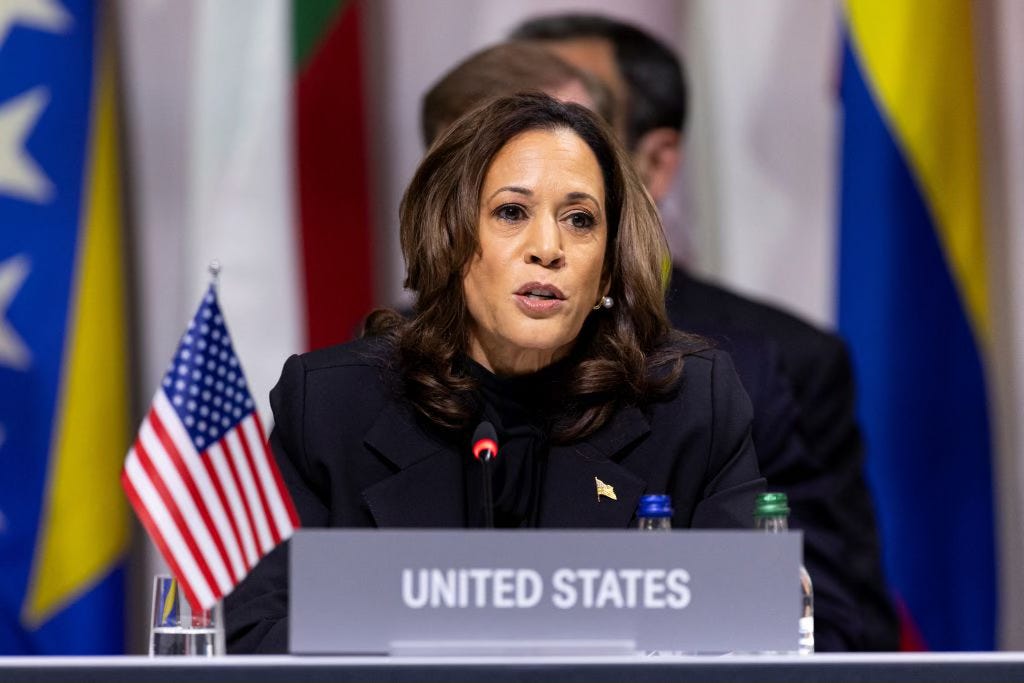UNBURDENED: How Harris could forge a post-neoliberal U.S. foreign policy
Global affairs expert Matthew Duss on how a Harris administration might recast America's relations with the world
Between the ongoing wars in Gaza and Ukraine, the Latin American migration crisis, and escalating tensions in the South Pacific, there could hardly be a worse time for the U.S. to be in the midst of a foreign policy identity crisis, yet that is the reality we currently face. However, the prospect of a generational change in the Oval Office brings with it the possibility of change in American’s basic approach to the world.
In the second installment of our Unburdened series, helping to envision a truly bold Harris administration’s policies, we talk with Matthew Duss — a former foreign policy advisor to Senator Bernie Sanders and a current executive vice president at the Center for International Policy — about how a potential Harris White House might tack away from the hawkish foreign policy of recent administrations towards a more equitable, post-neoliberal approach to foreign affairs that benefits workers at home and across the globe.
The vibes are good, as we have noted. But it’s time to begin thinking about what Americans can and should demand of a Harris administration determined to make its work.
UNBURDENED is The Ink’s interview series named after Vice President Harris’s catchphrase, where we ask some of the smartest policy minds out there to envision a bold, aggressive Harris agenda to materially improve people’s lives — unburdened by what has been.
Previously: “Unburdenomics” feat. Astra Taylor
As always, if you like what we do here, would you consider joining us as a supporting subscriber? This is what makes it possible for us to bring you this work and keep going. We are grateful.
“Post-neoliberalism”: a conversation with Matthew Duss
So — and I know you've actually been in this role before — but if the Harris campaign or if Kamala Harris picked up the phone and called you and said, "Hey, can you be my advisor on foreign policy?" What would be your top policy wishes?
I would say there are two right now, I'd say there is an urgent one and a bigger picture one.
And for me, the more urgent one is the war in Gaza, which has steadily been spreading throughout the region, not just recently, but for months. As I wrote with my colleague in a piece recently in The New York Times, it hasn't spread and become an all-out war in part because of some good diplomatic effort by the Biden administration, but also because of some luck.
And I think up until now, President Biden has simply not been willing to use what I think is the appropriate U.S. leverage in the form of cutting arms sales to pressure Netanyahu. I would hope that a President Harris would be willing to do that. This is something that already exists in U.S. law.
This is something a number of members of Congress, including Senator Sanders, Senator Van Hollen and others have been pressing on. There is clear evidence of violations, like severe violations of international humanitarian law, whether in the indiscriminate bombing — President Biden himself has used that word multiple times — or the restriction of humanitarian aid reaching people in Gaza. These are violations of U.S. law that govern the provision of military aid.
So what I would hope is for a President Harris to be willing finally to enforce that law as a way of putting genuine pressure on the Israeli government, Netanyahu in particular, to accept a ceasefire. Because, ultimately, getting that ceasefire is the way to stop this war from continuing to spread through the region. And that unlocks all kinds of other things, both domestically and in terms of foreign policy.
In that it would open the way to dealing with what's becoming an expanding regional conflict? There's the ongoing proxy war with Iran, and there's the war in Lebanon, which, again, is part of that same continuum. There would have to be a renewed diplomatic effort there, too.
I'll just reference a piece I wrote in Foreign Policy right after the transition was made to Harris as the candidate. I think there's a number of things that she can do.
I give President Biden a lot of credit, certainly on domestic policy. He has an enormously successful record, I think. On foreign policy, it's more of a mixed bag. There are definitely some successes I can point to and do point to in the piece.
But the Middle East is one region in which I think he has been trapped in an earlier era — in an outdated understanding of Israel and the region. And I think that there are things that Harris could do to really show that she's promoting a new vision of America's role in that region and how it connects to America's role in the world. And one is dealing with the issue of Iran.




